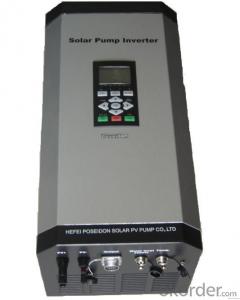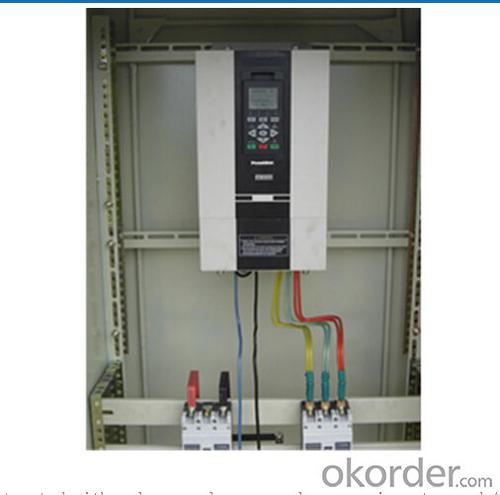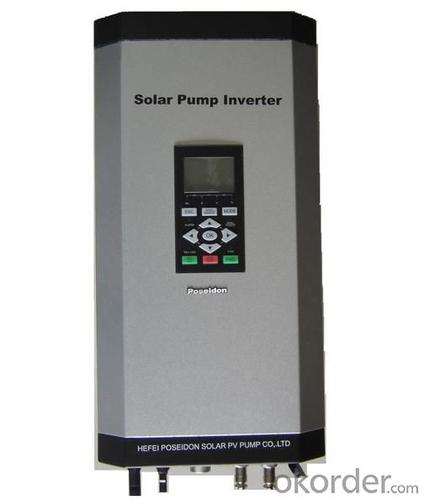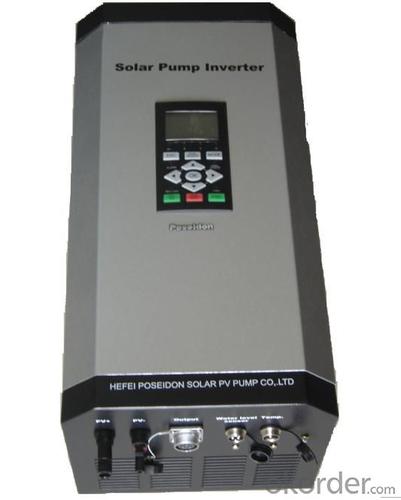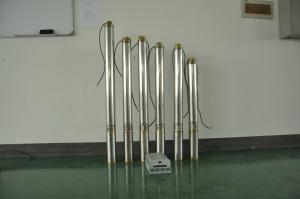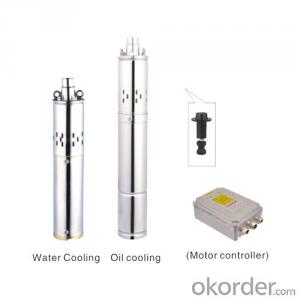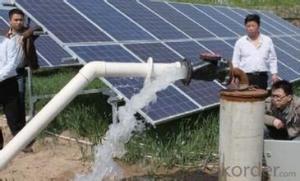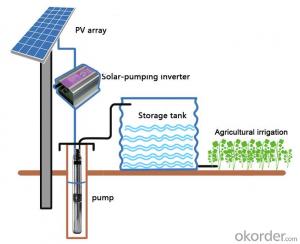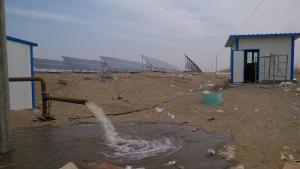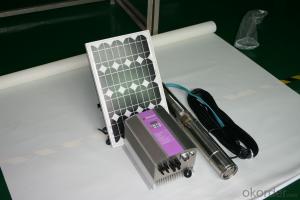Dankoff Solar Pump FCPM37KH Inverter
- Loading Port:
- China Main Port
- Payment Terms:
- TT OR LC
- Min Order Qty:
- -
- Supply Capability:
- -
OKorder Service Pledge
Quality Product, Order Online Tracking, Timely Delivery
OKorder Financial Service
Credit Rating, Credit Services, Credit Purchasing
You Might Also Like
Solar pump inverter FCPM37KH Product Description:
Solar water pumping system is constructed with solar panel array,solar pump inverter and AC water pump, DC current produced from solar panel will be delivered to solar pump inverter,and it will convert it into AC current to drive water pump,and will automatically regulate output frequency according to sun radiance intensity,maximally realize MPPT tracking function.
Features
Adopting the proposed dynamic VI maximum power point tracking (MPPT) control method, with fast response, and reliable operation, achieves efficiency of 99%.
Designed with variable frequency driver, greatly improves efficiency
Extremely high efficiency
Digital mode control, with automatic operation and manual operation mode options
Complete protection functions
Adopts intelligent IPM module, with high reliability
LCD display and operation panel, in real time presents operating data
Optional for water level measurement and control circuit
Applicable for general ACC pumps, like centrifugal pump, piston pump etc.
Independent intellectual property; Highly effective, the redundant reliability, exempts the maintenance and the long life.
The pumps are soft started, fully protected.
No batteries are used. So better Sunlight, more water.
Datasheet.
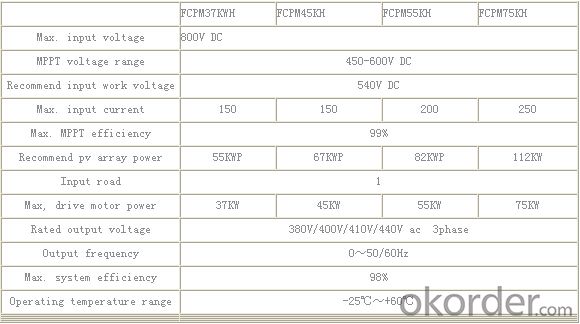
- Q: What is the payback period for a solar pump investment?
- The payback period for a solar pump investment is the amount of time it takes for the initial investment to be fully recovered through energy savings and other financial benefits. It is a crucial metric for evaluating the financial viability of such an investment. The actual payback period for a solar pump investment can vary depending on various factors such as the cost of the equipment, installation expenses, energy tariffs, and maintenance costs. Additionally, the amount of energy generated by the solar pump and the price of alternative energy sources in the region also play a significant role in determining the payback period. Typically, solar pump investments have relatively shorter payback periods compared to traditional pump systems powered by non-renewable energy sources. This is due to the lower operating costs associated with solar power, as sunlight is a free and abundant resource. Moreover, solar pumps require minimal maintenance and have a longer lifespan, reducing overall operational expenses. On average, the payback period for a solar pump investment ranges from 2 to 5 years. However, in some cases, it can be as short as 1 year or as long as 7 years, depending on the aforementioned factors. It is important to conduct a thorough financial analysis considering these variables to determine the specific payback period for a solar pump investment. Despite the initial capital required, a shorter payback period indicates a more financially attractive investment. Once the payback period is achieved, the solar pump investment will continue to generate energy savings and financial benefits for an extended period, contributing to long-term cost reductions and environmental sustainability.
- Q: How does a solar pump handle water with high levels of acidity or alkalinity?
- A solar pump is typically not designed to handle water with high levels of acidity or alkalinity. Water with extreme pH levels can damage the components of the pump, such as the motor, wiring, or pump housing. To handle water with high acidity or alkalinity, it is recommended to use additional equipment like filters, pH neutralizers, or pre-treatment systems to adjust the water's pH level before it reaches the solar pump. These precautions help protect the pump and ensure its optimal functionality.
- Q: Are there any limitations to the depth of water a solar pump can lift?
- There are indeed limitations to the depth at which a solar pump can lift water. The maximum depth that a solar pump can lift water is determined by various factors, including the power and efficiency of the solar panels, the size and capacity of the pump, and the distance between the pump and the water source. Usually, solar pumps are designed to lift water from depths ranging from 20 to 200 feet. Nevertheless, as the depth increases, the power required to lift the water also increases. Solar panels have a limited capacity to generate power, especially in low-light conditions or on cloudy days, which can affect the pump's performance. Moreover, the efficiency of the pump itself may decrease as the depth increases, as it must work harder against gravity to lift the water. In the case of extremely deep water sources, it may be necessary to utilize specialized solar pumps or combine solar power with other energy sources like batteries or generators to overcome these limitations. To determine the appropriate solar pump for specific depth requirements, it is advisable to consult with a professional or the pump's manufacturer.
- Q: Do solar pumps require any special permits or approvals for installation?
- Yes, solar pumps may require special permits or approvals for installation. The specific requirements vary depending on local regulations and the size of the pump system. It is advisable to consult with local authorities or a licensed professional to determine the necessary permits and approvals before installing a solar pump.
- Q: How does the performance of a solar pump vary with different solar panel angles?
- The performance of a solar pump can change when solar panels are angled differently. This is mainly because of the variations in sunlight exposure and energy conversion efficiency. The position of the solar panels affects the amount of sunlight they receive, which directly influences the power output and overall performance of the solar pump. When solar panels are positioned at the optimal angle, which is typically determined based on the location's latitude, they receive the maximum amount of sunlight throughout the day. This results in higher power generation, leading to increased pumping capacity and efficiency of the solar pump. However, if the angle of the solar panels deviates significantly from the optimal angle, the amount of sunlight reaching the panels may decrease, resulting in reduced power output and ultimately affecting the performance of the pump. In some cases, adjusting the angle of the solar panels can be beneficial in order to align with seasonal changes. For instance, tilting the panels more vertically during the winter months can capture the lower sun angle and boost energy production. On the other hand, a flatter angle during the summer months can prevent overheating and optimize performance. It is important to note that the impact of different solar panel angles on pump performance may differ depending on factors such as geographical location, climate, and the specific design of the solar pump system. Therefore, it is recommended to evaluate and optimize the angle of the solar panels based on the specific requirements and conditions of the solar pump installation in order to achieve the best possible performance and efficiency.
- Q: Can a solar pump be used for rainwater harvesting or stormwater management?
- Certainly! Solar pumps have the ability to be utilized for rainwater harvesting as well as stormwater management. By harnessing the power of solar energy, these pumps offer an eco-friendly and cost-efficient solution for the pumping and control of water. They possess the capability to gather rainwater in storage tanks or reservoirs, enabling its usage in a variety of applications such as irrigation, domestic consumption, or the replenishment of groundwater. Furthermore, solar pumps can play a vital role in stormwater management by either removing excessive stormwater from flood-prone areas or diverting it towards infiltration systems to prevent erosion and runoff. The utilization of solar pumps in rainwater harvesting and stormwater management contributes to the conservation of water resources and reduces reliance on traditional energy sources.
- Q: How does the energy usage of a solar pump system vary with different pumping depths?
- Different pumping depths can lead to varying energy usage in a solar pump system. Typically, the deeper the pumping depth, the more energy is necessary to pump water. This is due to the fact that as the water level decreases, the pressure head increases, which demands more effort from the pump. In a solar pump system, solar panels play a crucial role in generating energy. These panels convert sunlight into electricity to power the pump. The amount of energy produced by the solar panels is influenced by factors such as the presence of sunlight, panel efficiency, and any shading or obstructions that might affect the panels' output. When it comes to pumping water from different depths, the energy usage of the solar pump system is impacted by two primary factors: the vertical distance the water needs to be pumped (referred to as the pumping head) and the horizontal distance the water needs to be pumped (known as the pumping distance). The pumping head is directly related to the depth of the water source. As the depth increases, so does the pumping head, requiring the pump to exert more energy to lift the water against gravity. Consequently, this results in higher energy consumption. Similarly, the pumping distance can also affect the energy usage of a solar pump system. The greater the horizontal distance the water needs to be pumped, the more energy is necessary to overcome friction losses in the pipes. In conclusion, it can be inferred that the energy usage of a solar pump system generally rises with greater pumping depths. However, it is important to note that advancements in solar panel technology and pump efficiency can help optimize energy consumption and minimize the impact of pumping depth on energy usage.
- Q: Can a solar pump be used in remote areas with no electricity access?
- Yes, a solar pump can be used in remote areas with no electricity access. Solar pumps utilize solar energy to power the pump and do not require grid electricity. This makes them a suitable solution for areas where electricity infrastructure is unavailable or unreliable. Solar pumps are highly efficient and can provide a reliable water supply for various applications such as irrigation, livestock watering, and domestic water supply in remote locations.
- Q: Are there any specific requirements for the solar panel installation of a solar pump?
- Yes, there are specific requirements for the solar panel installation of a solar pump. Here are some key considerations: 1. Solar panel capacity: The solar panel system should have sufficient capacity to generate the necessary energy to power the solar pump. This depends on factors such as the pump's power requirements, daily water demand, and location's solar irradiation levels. It is crucial to accurately calculate the required capacity to ensure optimal performance. 2. Orientation and tilt: The solar panels should be installed in a location that receives maximum sunlight exposure throughout the day. The ideal orientation is facing south (in the Northern Hemisphere) or north (in the Southern Hemisphere) to capture the most sunlight. Additionally, the tilt angle of the solar panels should be set to optimize energy production based on the geographical latitude. 3. Shading: It is essential to avoid any shading on the solar panels, as even partial shading can significantly reduce their efficiency. Prior to installation, a thorough assessment of the surrounding environment should be conducted to identify potential shading sources, such as trees, buildings, or other structures. The solar panels should be positioned in an area with minimal shading. 4. Mounting structure: The solar panels must be securely mounted to withstand environmental conditions like wind, snow, and potential natural disasters. Depending on the installation location, the appropriate mounting structure should be selected, such as roof-mounted, ground-mounted, or pole-mounted systems. The structure should ensure proper ventilation and maintenance access for the solar panels. 5. Wiring and electrical connections: The wiring for the solar panels should be correctly sized to handle the electrical load and minimize energy losses. It is crucial to follow local electrical codes and safety guidelines during the installation process. Proper grounding and connection to the solar pump system are also important to ensure safe and efficient operation. 6. Maintenance and monitoring: Regular maintenance of the solar panels is necessary to ensure optimal performance and longevity. This includes cleaning the panels from dust, dirt, or debris and inspecting for any damage. Additionally, monitoring systems can be installed to track the energy generation and diagnose any potential issues promptly. It is important to consult with a qualified solar installer or engineer to determine the specific requirements for the solar panel installation of a solar pump, as they can provide expertise tailored to your specific needs and location.
- Q: Are solar pumps suitable for both residential and commercial use?
- Yes, solar pumps are suitable for both residential and commercial use. Solar pumps are highly versatile and can be used for a variety of applications including irrigation, water supply, and other fluid management tasks. They are an excellent choice for both residential and commercial settings as they offer several advantages. Firstly, solar pumps are environmentally friendly as they utilize clean and renewable energy from the sun, reducing carbon emissions and dependence on non-renewable energy sources. This makes them ideal for individuals and businesses looking to adopt sustainable practices. Secondly, solar pumps can significantly reduce operating costs in the long run. While the initial investment may be higher compared to traditional pumps, solar pumps have minimal operational and maintenance costs since they do not require fuel or electricity to function. This can result in substantial savings on utility bills for both residential and commercial users. Additionally, solar pumps are reliable and efficient. They can operate independently of the electrical grid and can be installed in remote areas where access to electricity may be limited or costly. Solar pumps also have low maintenance requirements, with many models designed to operate for several years without major servicing or component replacements. Lastly, solar pumps offer scalability, meaning they can be tailored to meet the specific needs of both residential and commercial users. Whether it's a small residential garden or a large-scale agricultural or industrial operation, solar pumps can be sized and designed accordingly. In conclusion, solar pumps are a suitable option for both residential and commercial use. Their environmental benefits, cost-effectiveness, reliability, and scalability make them an attractive choice for individuals and businesses looking to harness the power of the sun for their pumping needs.
Send your message to us
Dankoff Solar Pump FCPM37KH Inverter
- Loading Port:
- China Main Port
- Payment Terms:
- TT OR LC
- Min Order Qty:
- -
- Supply Capability:
- -
OKorder Service Pledge
Quality Product, Order Online Tracking, Timely Delivery
OKorder Financial Service
Credit Rating, Credit Services, Credit Purchasing
Similar products
Hot products
Hot Searches
Related keywords


